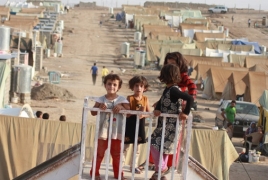Growing numbers of refugees return to war zones in Syria October 5, 2015 - 13:20 AMT PanARMENIAN.Net - Growing numbers of Syrian refugees are returning to their war-ravaged homeland from Jordan because they can't survive in exile after drastic aid cuts, can't afford to pay smugglers to sneak them into Europe or are simply homesick, the Associated Press reports. The returns, along with the increasing migration to Europe, signal that conditions in regional host countries have become increasingly intolerable, the refugees and aid officials said. "We stopped getting any aid," said 47-year-old Adnan, waiting at the UN-run Zaatari refugee camp in northern Jordan to sign up his family for the return bus to the Syrian border, about 10 kilometers (6 miles) away. He only gave his first name for fear of repercussions from Syrian authorities. The UN refugee agency views the rising number of departures with concern, AP says. "It is a dangerous choice for people to make," said Andrew Harper, head of the U.N. refugee agency in Jordan. He said the return of refugees, mainly women and children, to war-torn Syria "signals a failure of the international protection regime." The journey costs thousands of dollars, including $400 for a new Syrian passport that enables him to fly to Turkey without a visa, as well as a plane ticket and bribes for the smugglers. Adnan said he can't afford to pay for the rest of the family — his mother, his wife, a six-year-old son, two daughters-in-law and two granddaughters. In recent months, departures by far outnumbered arrivals, and the outflow is increasing. 3,853 refugees returned to Syria in August, compared to 1,934 in July, according to UN figures. Azerbaijani President Ilham Aliyev arrived in Moscow on April 22 to hold talks with Russian counterpart Vladimir Putin. Authorities said a total of 192 Azerbaijani troops were killed and 511 were wounded during Azerbaijan’s offensive. In 2023, the Azerbaijani government will increase the country’s defense budget by more than 1.1 billion manats ($650 million). The bill, published on Monday, is designed to "eliminate the shortcomings of an unreasonably broad interpretation of the key concept of "compatriot". Partner news |